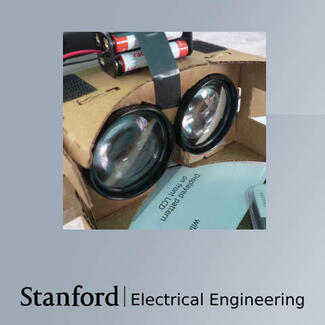
Wetzstein’s research offers new focus on progressive lenses
‘Autofocals' could resolve eyeglass shortcomings.
Professor Gordon Wetzstein and team recently published their findings in Science Advances.
The researchers have created a pair of smart glasses that can automatically focus on what you're looking at. Using eye-trackers and autofocus lenses, the prototype works much like the lens of the eye, with fluid-filled lenses that bulge and thin as the field of vision changes. It also includes eye-tracking sensors that triangulate where a person is looking and determine the precise distance to the object of interest. The team did not invent these lenses or eye-trackers, but they did develop the software system that harnesses this eye-tracking data to keep the fluid-filled lenses in constant and perfect focus.
EE PhD candidate Nitish Padmanaban, said other teams had previously tried to apply autofocus lenses to presbyopia. But without guidance from the eye-tracking hardware and system software, those earlier efforts were no better than wearing traditional progressive lenses.
Gordon's team tested the prototype on 56 people with presbyopia. Test subjects said the autofocus lenses performed better and faster at reading and other tasks. Wearers also tended to prefer the autofocal glasses to the experience of progressive lenses – bulk and weight aside.
Gordon's Computational Imaging Lab is at the forefront of vision systems for VR and AR (virtual and augmented reality). It was in the course of such work that the researchers became aware of the new autofocus lenses and eye-trackers and had the insight to combine these elements to create a potentially transformative product.
Excerpted from Stanford News.